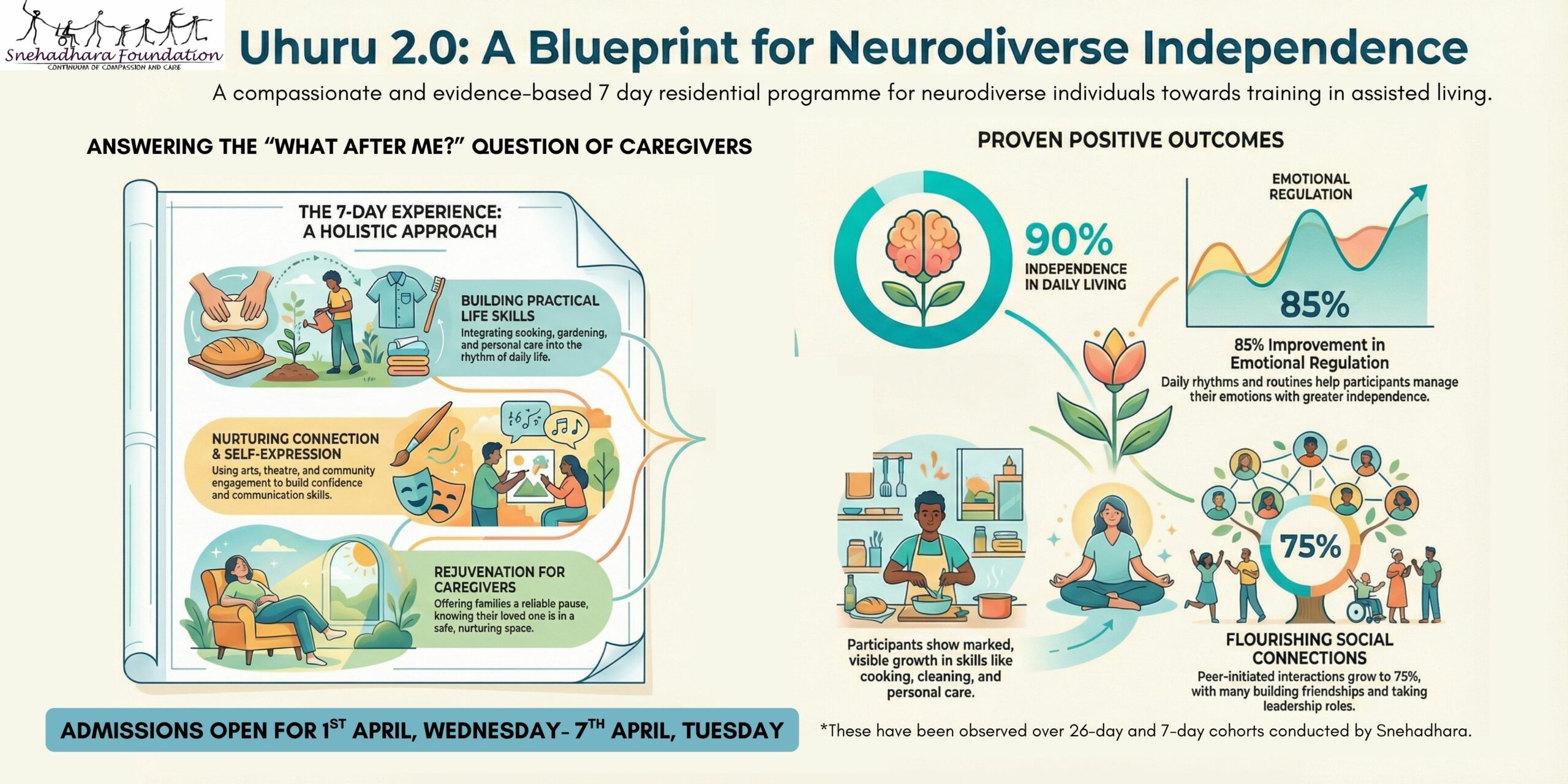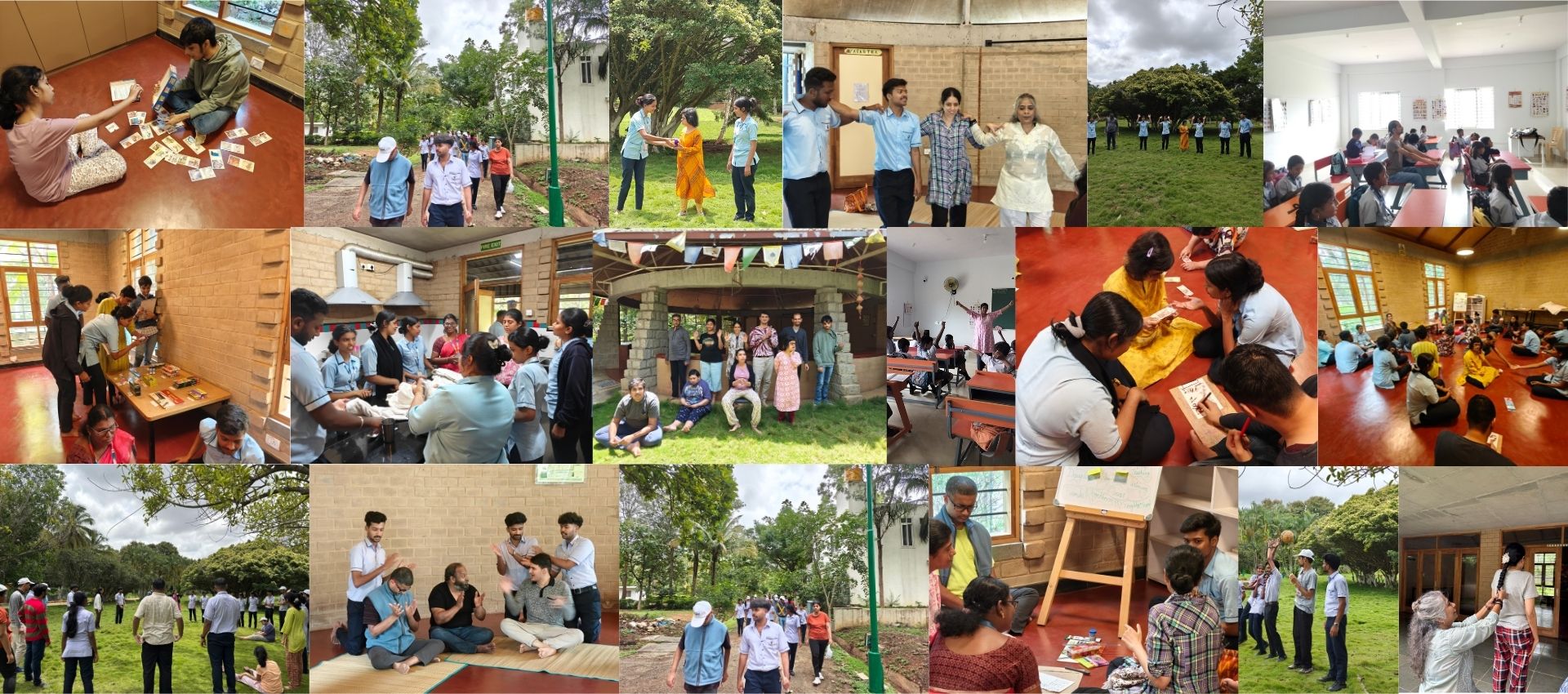Uhuru 2.0
A Living Response to “What After Me?”
Rooted in rhythm. Held in care. Open to all.
Let’s not just prepare individuals for the future.
Let’s prepare the future itself to hold them.
A 7-Day Residential Offering for Neurodiverse Individuals
The Genesis
Uhuru was born out of a silent, lingering question etched deep in the hearts of many caregivers: What after me? Not a question of despair, but one of deep responsibility, care, and longing for continuity. What began as an experiment in assisted living has now evolved into a grounded, evidence-based response.
Over two transformative cohorts, neurodiverse adults, their families, and facilitators came together in a shared rhythm — of life, of learning, and of care. The programme wove together arts practices, community tasks, social immersion, and structured learning, all scaffolded with dignity and joy. With each passing day, what emerged was more than skill—it was identity, resilience, and belonging. Read more about these cohorts here.
Uhuru 2.0 is a short-term, high-impact, monthly 7-day residential offering that retains the heartbeat of the programme while becoming accessible to many more.
Why Uhuru 2.0?
Across two 26-day and four 7 day cohort, the outcomes were unmistakable:
-
Assisted Daily Living (ADL) skills saw marked growth: Cohort 1 participants showed a 30% increase but still needed scaffolding, while Cohort 2 jumped to 90% visible independence, and even in just 7 days, most Uhuru 2.0 participants adapted independently.
-
Emotional regulation improved across cohorts: 78% of Cohort 1 needed co-regulation, but 80% in Cohort 2 and 85% in Uhuru 2.0 managed emotions with much greater independence, thanks to rhythm and routines.
-
Community participation and vocational engagement remained high throughout, with nearly 100% engagement in shared tasks, group rhythm activities, and visible motivation where outcomes were tangible (like clay products or kitchen tasks).
-
Social interaction and communication matured rapidly: expressive engagement ranged from 80–89%, and peer-initiated interaction grew from 67% in Cohort 1 to 75% in Uhuru 2.0, with many first-timers building friendships and taking on leadership roles within days.

Why 7 Days?
The 7-day format is intentional. It is long enough to immerse, practice, and internalize key rhythms of assisted living — yet short enough to integrate into existing home and work routines.
Training in assisted living is a skill just like one learns music, math, or sport, adults need structured, scaffolded time to build autonomy, develop confidence, and nurture their ability to live and relate independently. This skilling is not only for the neurodiverse adult but equally for families and society, so that relationships and systems can hold space for autonomy with dignity.
For neurodiverse adults, this format allows them to return to the communities, homes, and workspaces they are already a part of, and then revisit Uhuru as a retreat which attempts to hold the space for recalibration, renewal, and reflection as a rhythmic anchor for their growth. Each visit strengthens their ability to navigate real-time challenges, foster partnerships, and deepen relationships.
For families and caregivers, this model offers a reliable pause. A moment to step back, replenish, and trust that their children are safe, seen, and thriving in a space built with care and intent. The consistent schedule ensures that caregivers can plan their own self-care or work commitments, knowing that Uhuru will be there month after month.
Uhuru 2.0 builds into existing protocols, not against them. It complements ongoing therapies, education, and employment acting as a reset and recharge point rather than a disruption. It invites continuity with the possibility of return.

Uhuru 2.0: The Offering
Starting July 2025, monthly residential immersions will be held at our Nelamangala campus. These are not workshops. They are not retreats. They are living spaces of practice, for neurodiverse adults and their families to explore autonomy, rhythm, and relational interdependence.
Each 7-day cycle includes:
- Arts-Based Practices: Movement, rhythm, theatre, and visual arts become tools for self-expression, communication, and joy.
- Independent Living Skills: Cooking, cleaning, gardening, personal care integrated into the rhythm of daily life with scaffolding that respects each learner’s pace.
- Social Immersion: Field trips, school visits, interactions with volunteers and artists, cultivating presence and ease in public spaces.
- Community Engagement: Participants take on shared responsibilities that foster mutual trust, co-holding, and celebration of everyday living.
- Caregiver Rejuvenation: This is not just a space for neurodiverse adults, it is a space for families to breathe. Parents are invited to pause, knowing their loved ones are nurtured in a space of purpose and safety.
Who is This For?
- Neurodiverse children, adolescents, and adults seeking a space to practice and build daily living and relational skills.
- Families and caregivers looking for community-based support models.
- Organizations and schools exploring inclusive living and learning environments.
- Artists, therapists, educators, and facilitators who want to be part of a collective that believes in rhythm, relationship, and radical inclusion.
The Invitation
Uhuru 2.0 is more than a programme. It is a path forward. A container for skill, a crucible for connection, and a soft revolution in how we prepare for what after me. It invites all of us to reimagine assisted living not as a burden, but as an ecosystem of shared care.
Whether you are a family asking this question, an organization seeking a replicable model, or a practitioner longing for meaningful collaboration, this is your invitation.
Come for a week. Leave with a lifetime of practice.
Our USP: A Retreat That Lives On
Unlike one-time interventions, Uhuru doesn’t end when the week ends. Its model lives on:
- In the rhythms participants carry home.
- In the stories and reflections they leave behind.
- In the training of facilitators and co-facilitators who go on to replicate this elsewhere.
Uhuru continues to exist in the spaces it touches. It is not only a training ground but a returning ground for learning, rest, and building anew.
Admission Process
- Reach out to us on our Admissions Page to connect with the team and know more about the programme.
COHORT DATES FOR 2026-27
April 1st – 7th 2026 (Wednesday to Tuesday)
July 25th – July 31st 2026 (Saturday – Friday)
November 28th – December 4th 2026 (Saturday to Friday)
January 10th – 16th 2027 (Sunday to Saturday)
